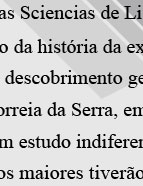

................................
For Marx, history was nothing more than the history of class struggle. On the other hand, through the concept of “mode of production” it was possible to think about the structure, functioning, and dynamics of a social totality. This concept would even be used by non-Marxists, such as Fernand Braudel (1902-1985), who considered Marx to be the first thinker to produce social models based on the long duration of history. After all, the Marxist “mode of production” considered not the isolated fact, but the social totality animated by economic determinism, as if expanding the place of political history to the social whole, while shifting the dynamics of historical change from the political to the economic. The development of Marxist-inspired historiography was fundamental in France and explored by figures such as Jean Jaurés (1859–1914), Albert Mathiez (1874–1932), Georges Lefebvre (1874–1959), and Ernest Labrousse (1895–1988), but it was curiously ignored in Germany (despite its re-elaboration by the so-called “Frankfurt School”) and in the Anglo-Saxon world.
Some innovative theoretical production would be attempted in other geographies such as Italy with Antonio Gramsci (1891–1937) and even in England, through the “New Left,” whose main names after World War II were Eric Hobsbawm (1917–2012) and E. P. Thompson (1924–1993). At the same time, in France, another generation of Marxist-inspired historians emerged, including names such as Georges Duby (1919–1996), Pierre Vilar (1906–2003), and Michelle Vovelle (1933–2018). Under the influence of the Annales, social history also developed and gained prominence in Great Britain, especially with the launch of the journal Past & Present (1952), and the approaches of historians like Christopher Hill (1912–2003), Lawrence Stone (1919–1999), and Peter Laslett (1915–2001).
As a result of all these changes, a shift of the core of historical study was witnessed, with its transfer from the isolated political event to economic structures, social classes, ideological phenomena, and the collective role of the masses as transformative agents of reality. The political dimension, since it was devalued, was reduced to an epiphenomenon.
